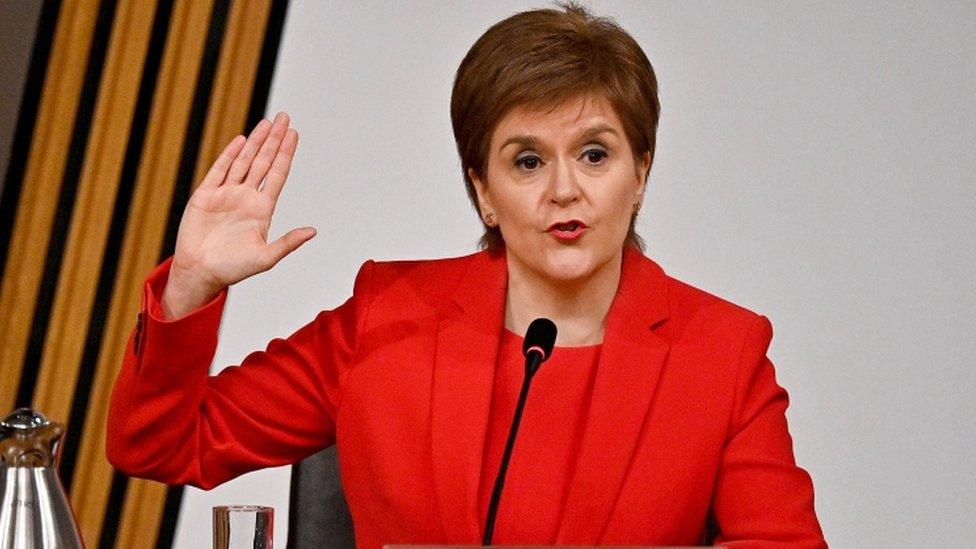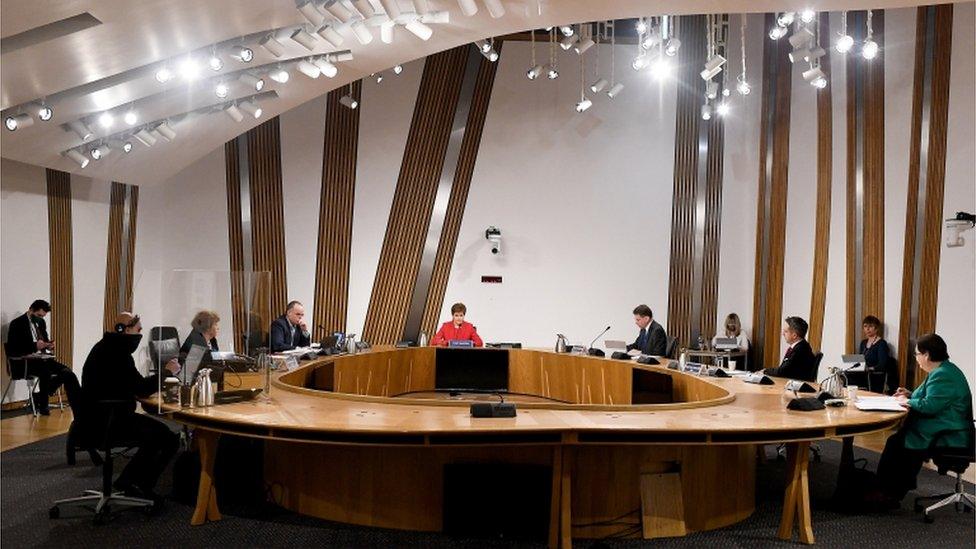Salmond committee criticises 'serious flaws' of Scottish government
- Published

Mr Salmond won a judicial review case after the government admitted its handling of complaints against him had been unlawful
The Scottish government's handling of harassment complaints against Alex Salmond was "seriously flawed", a committee of MSPs has concluded.
The committee said women had been badly let down by the government.
And they said they found it hard to believe that First Minister Nicola Sturgeon was not aware of concerns about Mr Salmond's alleged behaviour before November 2017.
They also said Ms Sturgeon had misled their inquiry in her evidence.
Ms Sturgeon has already been cleared of breaching the ministerial code by a separate independent inquiry headed by senior Irish lawyer James Hamilton.
She said last week that she stood by all of the evidence she gave to the committee during her marathon eight-hour evidence session earlier this month, and has repeatedly apologised to the women who made the complaints.
Many of the committee's findings were unanimous, but others were divided along party lines - with the four SNP MSPs being outvoted by the two Conservatives, one Labour, one Liberal Democrat and independent MSP Andy Wightman.
The committee had been examining the government's botched handling of two sexual harassment complaints that were made against Mr Salmond by two female civil servants in 2018.
The government was forced to admit it had acted unlawfully in its investigation and paid the former first minister's legal fees of £512,000 after he launched a judicial review case.
Mr Salmond was later cleared of 13 charges of sexual assault against nine women after a separate High Court trial in March of last year.
He has accused government and SNP officials close to Ms Sturgeon - including her husband Peter Murrell, the party's chief executive - of running a "deliberate, prolonged, malicious and concerted effort" to damage him and even have him sent to prison.
Ms Sturgeon and her allies have dismissed these allegations as being false conspiracy theories.

Ms Sturgeon has already been cleared of breaching the ministerial code by a separate inquiry
Members of the inquiry committee voted by five to four that there had been a "fundamental contradiction" between Ms Sturgeon's account of meetings she had with Mr Salmond after the complaints were made, and the evidence given by his team.
And they said they believed she had left her predecessor with the impression she might intervene in the complaints process.
They voted by the same margin that her written evidence was "an inaccurate account of what happened", and that "she has misled the committee on this matter".
The report also said members were "concerned" about how long it had taken Ms Sturgeon to inform the government's permanent secretary that she was aware of the complaints.
And it said it was "inappropriate for the first minister to continue to meet and have discussions" with Mr Salmond.
The report also described the outcome of the judicial review case as being "devastating" for the government, as well as being "wholly unsatisfactory for the two women who had made complaints".
It added: "This is not just about procedures or public money. It is about ensuring that, in the future, anyone complaining about sexual harassment is not let down in the way these women have been."
The committee has made a series of recommendations which it said would help ensure similar mistakes do not happen in the future, and ensure confidence in future complaints processes.


Today's report from the committee will make more difficult reading for Nicola Sturgeon.
MSPs have spent some time looking into the Scottish government's handling of allegations against Alex Salmond - and they have a number of concerns.
The most serious allegations are that Ms Sturgeon misled the committee and the doubt they cast on her account of when she first found out about concerns about Mr Salmond.
This will mean the political row continues.
But Ms Sturgeon will point to the report for her independent adviser which concluded she did not break the ministerial code.
That was always going to be the key moment - and would have been extremely dangerous for Ms Sturgeon if he had concluded she broke the rules.
What does it all mean? Nicola Sturgeon is going nowhere. She will fight May's election saying her independent adviser cleared her. Her opponents will argue differently.

The committee was unanimous in saying that the government should have taken more time over the drafting of the new complaints procedure and should have included an independent system for reporting and investigating complaints.
The report said that the "multiple roles" fulfilled by Permanent Secretary Leslie Evans in the process "should have been seen as a significant organisational risk", saying this "places a question mark over the process".
And they were critical of the government's handling of the judicial review case brought by Mr Salmond, saying there was a "major flaw" and a "significant failure" in the failure to identify and hand over relevant documents to the court.
Members were split over Ms Sturgeon's role in the judicial review, but agreed by five votes to four that they were "concerned that the first minister decided to proceed with the judicial review despite clear advice that it would likely fail."
But they agreed unanimously that "the Scottish government was responsible from an early stage for a serious, substantial and entirely avoidable situation that resulted in a prolonged, expensive and unsuccessful defence" of the judicial review."
They said "this state of affairs is unacceptable by an organisation such as the Scottish government and that those responsible should be held accountable".
The committee - some of whose findings were leaked last week - also said it was "extremely serious" that the allegations against Mr Salmond were leaked to the Daily Record newspaper in August 2018.
Mr Salmond has suggested that the leak to the newspaper came from the government - but an independent investigation by the Information Commissioners Office found there was no firm evidence for this

The committee complained throughout its inquiry that its work was being frustrated by both the government and Mr Salmond
The committee said it had "tried as far as possible to shine a light on what occurred".
But it said its work had been "hindered by the Scottish government's failure to produce key documents which were of interest to us until a very late stage in the inquiry".
The report added: "To leave it to a committee to have to drag information out of government and other bodies is a wholly unacceptable response to the accountability that is meant to exist by the executive to parliament."
Committee convener Linda Fabiani, an SNP MSP, told the BBC's Good Morning Scotland programme that it had to redact "a lot of information" from its report, and had been unable to publish some of the evidence it had received.
The redactions meant there were parts where "the full picture is not given", she said, but she insisted that these were "very small elements".
'Monumental mistakes'
The Scottish Conservatives plan to hold a vote of no confidence in the first minister later on Tuesday - but it is doomed to fail after the Scottish Greens said they would back Ms Sturgeon.
Conservative leader Douglas Ross said the committee's verdict was that Ms Sturgeon had "misled parliament and the public".
He added: "If she ploughs on regardless, as she did against the advice of lawyers in the doomed Alex Salmond judicial review case, the first minister will leave the country scarred by the most bitter divisions.
"It seems clear that Nicola Sturgeon will refuse to abide by the principle of democratic accountability for her government's monumental mistakes."
Scottish Labour's deputy leader Jackie Baillie, who is a member of the committee, said the report highlighted the "catastrophic failings of the Scottish government on a matter of the utmost seriousness and sensitivity".
She added: "Three years on, nobody has yet taken responsibility for this failure.
"The Hamilton report may have exonerated the first minister of breaching the ministerial code, but the catastrophic and myriad failings this committee inquiry has revealed have called into question her judgement."